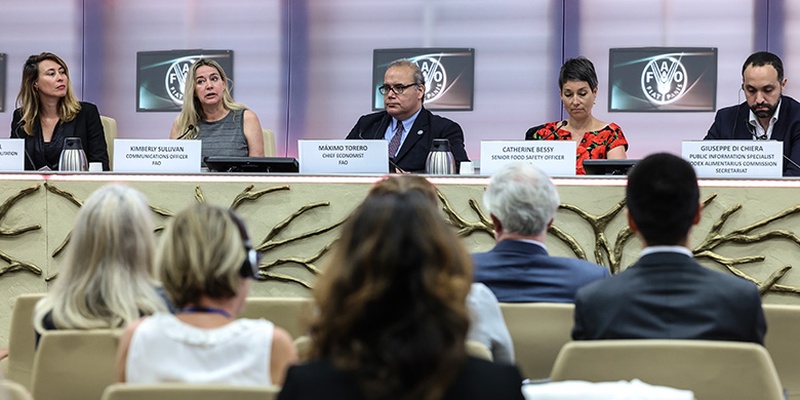A project assessing food control and plant health systems in Africa on the spotlight during World Food Safety Day
Posted on Wed, 14 Jun 2023, 09:18

Photo © FAO
12/06/2023
The Food and Agriculture Organization of the United Nations (FAO) joined top experts and international officials during Wednesday’s World Food Safety Day celebration to discuss a new project assessing food control systems and phytosanitary capacities to ensure food safety and plant health in 11 African Union nations.
The event, organized around this year’s theme of ‘Food standards save lives, brought together representatives from the European Union, African Union Commission, African Union Member countries, and FAO leaders and technical teams.
FAO Chief Economist Maximo Torero spoke of the multi-sectoral, inter-disciplinary and collaborative approach that came through during the panel. Speaking of the assessments being implemented in the countries, he said “this is thorough, detailed and difficult work that countries need to do to craft targeted interventions that can improve the governance of the food control systems and phytosanitary systems at the national level.”
The project "Strengthening of Capacities and Governance in Food and Phytosanitary Control” was the topic addressed by the first of four events on Wednesday, 7 June 2023. It focused on how FAO and the International Plant Protection Convention (IPPC) Secretariat are providing technical support and working with national Competent Authorities and other leading institutions to build capabilities, strengthen governance and improve strategic planning around two main components: food safety and plant health.
At the centre of the two components are two state-of-the-art tools. The FAO/WHO Food Control System Assessment Tool is a unique instrument developed jointly between FAO and the WHO, which comprehensively evaluates the capacities of a country’s food control system.
The Phytosanitary Capacity Evaluation (PCE) is a powerful management tool that enables countries to identify their strengths and weaknesses in plant health management. This tool empowers countries to develop their own plant health plan and implement it efficiently. The PCE has been successfully used to update phytosanitary laws, establish national phytosanitary capacity development strategies, and mobilize resources to implement priority activities.
The panel included members from the technical team that is leading the project, as well as representatives from European Union Delegation to the African Union which is funding the project and representative of the African Union.
It also brought in the perspectives of the actors involved in the project from the field, specifically from Mauritius, Rwanda and the Seychelles. Representatives from each of these countries described the challenges and objectives of their countries’ food safety and plant health context and how the project responds to their country’s needs. They shared their unique experiences with the assessments and spoke of their governments’ overall enthusiasm and commitment towards the project. The speakers praised the project for building synergies across the numerous institutions that form the food system. Khurun Poojanraj from the Ministry of Agriculture of Mauritius, spoke about the opportunity that the project activities offered “to have all the people involved in achieving the same food safety objectives come together and know each other”. He said that was a first step in breaking existing silos in the food control system and to enhance inter institutional coordination.
The European Union is funding the project as part of its wider support of the Sanitary and Phytosanitary (SPS) Policy Framework and to increase harmonization in the African Union region. Eulade Mboneye from the Delegation of the European Union to the African Union spoke of that effort and how the project was contributing to the SPS systems in Africa also in terms of aligning itself to international standards.
Improved food control and phytosanitary systems along with its positive trade implications is the ultimate goal of the project. The World Food Safety Day event was an opportunity to raise awareness around the subject and to shed light on a critical piece of that effort. “Implementing an assessment is really the first step towards strengthening the food control system, and deliver better food safety outcomes,” said Catherine Bessy, Senior FAO Food Safety Officer and lead on the project, adding, “this has in turn a strong positive impact on trade.”
To view the webcast of the event: https://www.fao.org/webcast/home/en/ To learn more about the project please click here
*Article originally published on Codex Alimentarius website.

